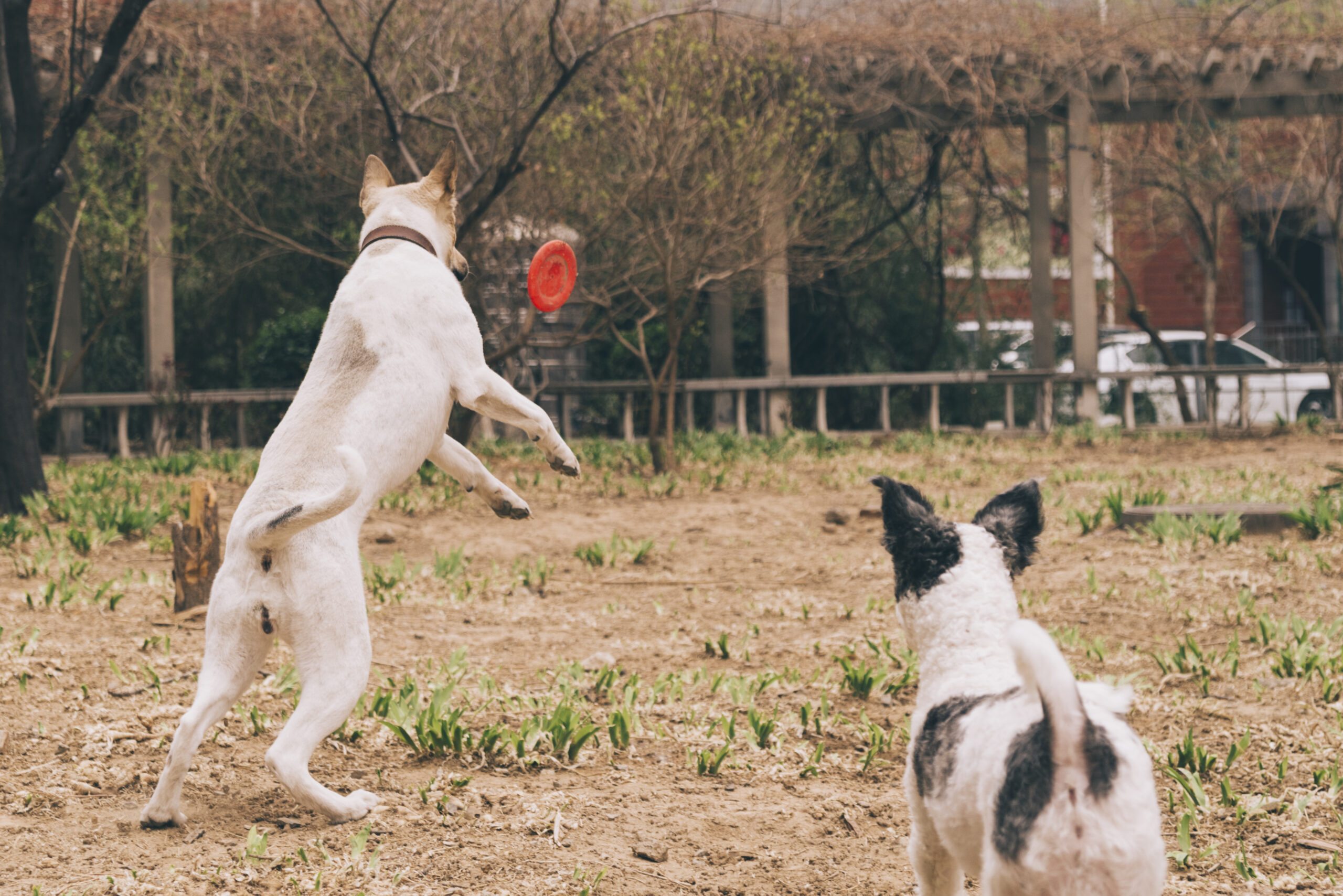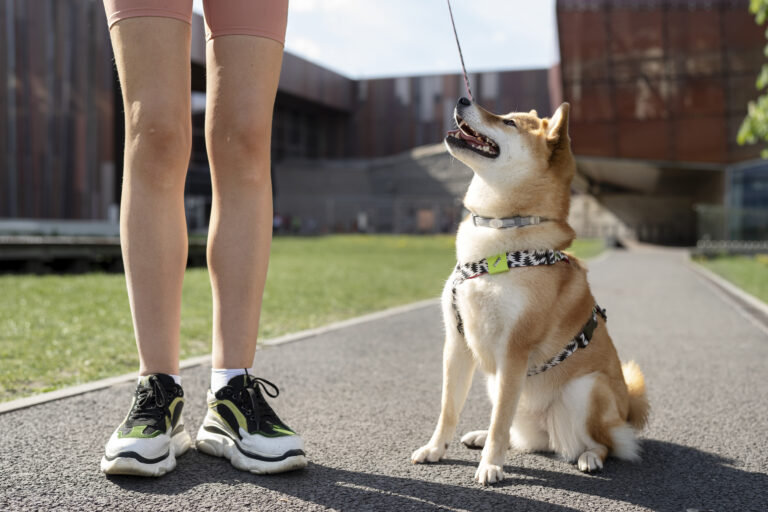Group Training or Private Lessons: Which Is Right for Your Dog?
Deciding between group training or private lessons for your dog is an important decision that can impact your dog’s learning and behavior. In this guide, we will compare group training or private lessons for dogs to help you choose the best option for your pet.
Historically, group training has been popular for its socialization benefits and cost-effectiveness. Yet, statistics show that dogs with particular behavioral challenges often flourish more in private lessons. A balanced approach, understanding your dog’s specific needs, can lead to the most effective training outcomes.

Distinguishing Between Group Training and Private Lessons for Dogs
Group training classes often involve multiple dogs at the same time, creating a lively and social environment. In these classes, dogs can learn basic commands like “sit” and “stay” while interacting with other dogs. Socialization in group settings can help dogs become more comfortable around their peers, reducing anxiety in public spaces. These classes are typically more cost-effective, making them a popular choice for many dog owners. However, the distractions present can sometimes make it harder for dogs to focus on their training.
Private lessons, on the other hand, offer one-on-one attention from a trainer. This personalized approach allows the trainer to focus on specific issues that your dog may have. For example, if your dog has aggressive tendencies or severe anxiety, a private session can address these problems more effectively. Additionally, these lessons can be scheduled at your convenience, providing flexibility. Yet, they are often more expensive than group classes.
Choosing between group training and private lessons depends on your dog’s personality and needs. Dogs that are friendly and enjoy social interactions may thrive in a group setting. Conversely, dogs requiring intensive behavioral corrections may benefit more from private lessons. Observing your dog’s behavior around other dogs and new environments can offer insights. Consulting with a professional trainer can also guide your decision.
Ultimately, both group training and private lessons have unique advantages and challenges. They cater to different aspects of dog behavior and learning. Finding the right fit often requires a bit of trial and error. Remember, the goal is a happier, well-behaved dog. Whether through group classes or one-on-one sessions, the right training can make a world of difference.

Key Characteristics of Group Training
Group training classes are designed to cater to multiple dogs simultaneously. These sessions are generally scheduled at regular times, offering a consistent routine for both the dogs and their owners. Each dog works on basic commands, often following the cues of other dogs in the group. The social setting can be beneficial for dogs that need to improve their interactions with peers. However, the structure might feel rigid for dogs that need more individualized attention.
One of the main benefits of group training is socialization. Dogs learn to function in an environment filled with distractions. This can be particularly useful for young puppies as it helps them become well-adjusted adults. In a group class, the varied activities help keep dogs engaged. The friendly competition among participants can also motivate dogs to perform better.
Cost is another important factor distinguishing group training. These classes are typically more affordable than private lessons. For families on a budget, group training offers an effective way to teach their dogs basic obedience at a lower cost. The financial aspect makes it accessible for many dog owners. Still, the trade-off is less personalized instruction.
Group training also promotes a sense of community among dog owners. Participants often share tips and experiences, creating a supportive environment. This camaraderie can make the training process more enjoyable. Additionally, seeing other dogs progress can inspire owners to stay committed to their training. This collective experience adds an extra layer to the training journey.
Benefits and Pitfalls of Group Training for Your Dog
Group training offers several benefits for dogs and their owners. Firstly, the social interaction it provides can be crucial for puppies and young dogs. They learn to behave well around other dogs, which makes future outings more enjoyable. Additionally, the structure of these classes can instill discipline and consistency. It’s also an economical choice, as group sessions are generally less expensive than private ones.
Another advantage of group training is the opportunity for owners to learn from each other. This communal setting allows for sharing tips and experiences, enhancing the overall learning process. Observing other dogs can also give owners a benchmark for their dog’s progress. The presence of multiple dogs creates a dynamic environment, which can keep training sessions lively and engaging. The variety helps dogs stay focused and interested.
| Benefits | Pitfalls |
|---|---|
| Socialization with other dogs | Distractions from other dogs |
| Cost-effective | Less personalized attention |
| Learning from peers | Rigid schedule |
However, group training is not without its challenges. One significant pitfall is the level of distractions present. Some dogs may find it hard to concentrate with so many other animals around. This can slow down their learning process. Additionally, the fixed schedule might not be convenient for all pet owners.
Because group training lacks personalization, it might not be suitable for dogs with specific behavioral issues. For instance, a dog with severe anxiety may not benefit from a bustling group setting. In these cases, more targeted one-on-one training would be advisable. Despite these drawbacks, many dog owners find group training to be an ideal starting point. Understanding these pros and cons can help make a well-informed decision for your dog.
Exploring the Pros and Cons of Private Lessons for Dogs
Private lessons provide tailored training sessions for your dog, usually held in your home or a familiar environment. This one-on-one format allows the trainer to focus on your dog’s specific needs. For example, if your dog exhibits aggressive behavior, a private trainer can develop a customized plan. These sessions can also be scheduled at times that are convenient for you. The personalized approach often leads to faster progress.
Another advantage of private lessons is the ability to address behavioral issues that might be challenging to handle in a group setting. Dogs with anxiety or aggression can benefit greatly from individualized attention. Private trainers can adapt their methods to align with your dog’s unique learning style. This flexibility can enhance the effectiveness of the training. Furthermore, the lack of external distractions can help your dog focus better.
| Pros | Cons |
|---|---|
| Personalized attention | Higher cost |
| Flexible scheduling | Limited socialization |
| Effective for behavioral issues | May require multiple sessions |
However, private lessons come with their drawbacks. The most notable is the higher cost compared to group classes. While the investment can be worthwhile for severe behavioral issues, it might not be necessary for simple obedience training. Additionally, private lessons lack the socialization aspect, which is crucial for some dogs. Limited interaction with other dogs can be a disadvantage.
Another con is that private training may require numerous sessions to achieve the desired behavior. It can take several weeks to notice significant changes. This means a longer commitment from both you and your dog. Moreover, finding the right trainer who has experience with your specific issues may be challenging. The search for a qualified trainer can add additional time and effort.
In sum, private lessons offer a focused and effective way to train your dog, especially for specific behavioral concerns. The customization and convenience are significant benefits, making it easier to address individual issues. However, it’s essential to weigh these advantages against the higher costs and potential lack of socialization. Considering all factors will help you make the best choice for your dog’s training needs.
Evaluating Your Dog’s Specific Needs: Private or Group Training
Assessing your dog’s individual requirements is key when choosing between private or group training. Some dogs are naturally social and thrive in group settings. They enjoy the interaction with other dogs and people, making group classes ideal for them. Conversely, dogs with behavioral issues, such as aggression or anxiety, may benefit more from private lessons. Identifying your dog’s temperament can guide your decision.
Age and past experiences are also crucial factors. Puppies and younger dogs often gain more from group training. They can socialize early, learning to behave around other dogs. Older dogs or those with traumatic past experiences might require the personalized focus of private lessons. This allows them to relearn positive behaviors in a controlled environment.
- Social dogs: Group training
- Aggressive or anxious dogs: Private lessons
- Young puppies: Group training
- Older or traumatized dogs: Private lessons
The goals you have for your dog’s training also play a role. Basic obedience and social skills can often be achieved in group settings. Advanced training or specialized commands may necessitate private sessions. Private lessons offer the opportunity to concentrate on these specific skills. Both forms of training can be effective, depending on what you aim to accomplish.
Time and budget are essential considerations as well. Group classes are generally less expensive but require a regular commitment to attend scheduled sessions. Private lessons, while more costly, offer flexibility in scheduling. They may also provide quicker results, depending on your dog’s learning speed. Balancing these factors can help you make the best choice.

Frequently Asked Questions
Making the right choice for your dog’s training can be daunting. These FAQs aim to help you understand the differences between group and private training.
1. What are the benefits of group dog training?
Group dog training offers several advantages, including enhanced socialization skills for your pet. Dogs in group settings learn to behave around other dogs, which is crucial for public outings and dog parks. Furthermore, these classes often provide a cost-effective way to teach basic commands. Owners also benefit by learning from others’ experiences and creating a community of support.
The interactive environment keeps dogs engaged and helps them adapt to different situations. Trainers usually introduce various distractions during these sessions, preparing dogs for real-world scenarios. This comprehensive approach ensures that both dogs and owners get more out of each class. Overall, it’s an excellent option for friendly dogs needing social exposure.
2. When should I consider private lessons for my dog?
You might opt for private lessons if your dog has specific behavioral issues like aggression or extreme shyness. One-on-one attention allows trainers to customize their methods based on individual needs, leading to quicker improvements in problematic behaviors. Private sessions also offer flexibility with scheduling, making it easier to fit into busy lives.
Additionally, if your dog struggles with concentration in distracting environments, private lessons can offer a controlled setting that minimizes disruptions. This focused approach helps reinforce good behavior more effectively than a bustling group class would allow. For unique challenges requiring specialized solutions, private lessons are highly recommended.
3. How does my dog’s personality affect my choice of training?
Your dog’s personality plays a significant role in deciding between group and private lessons. Some dogs are naturally sociable and enjoy interacting with other pets and people; they will likely thrive in a group setting where they can engage socially while learning new commands or tricks.
On the other hand, more reserved or anxious dogs may find the atmosphere overwhelming and could benefit from the tailored approach offered by private sessions instead . Assessing your dog’s behavior closely will help you make an informed choice tailored specifically towards what suits them best.
4. Is there a difference in cost between group and private dog training?
Yes , there is typically a significant difference in cost between group and private dog training classes . Group sessions generally tend to be less expensive because one instructor can work with multiple dogs at once , making it more affordable overall compared solely individualized attention options .
However , despite being more costly per session , many pet owners find value investing personally catered instructional time their pups receive specialized care address unique needs faster results effectively provided thorough feedback adjustments required improve performance promptly when necessary hence justifying higher price tag attached those services comparatively speaking due higher quality experience gained through process involved involved journey experienced taking part together during such times bonding moments shared strength ties created lasting lifetime memories built solid foundation canine companionship established along way ultimately leading healthier happier harmonious living conditions everyone within household included family members alike!
Conclusion
Choosing between group training and private lessons for your dog hinges on their unique needs and your goals. Group training is ideal for socialization and basic obedience at a lower cost. Conversely, private lessons offer tailored attention for specific behavioral issues, albeit at a higher price tag.
Both types of training provide valuable skills and benefits, depending on your dog’s temperament and requirements. By carefully considering these factors, you can make an informed decision. Ultimately, the right training will lead to a happier, well-behaved dog, making your life together more enjoyable.




